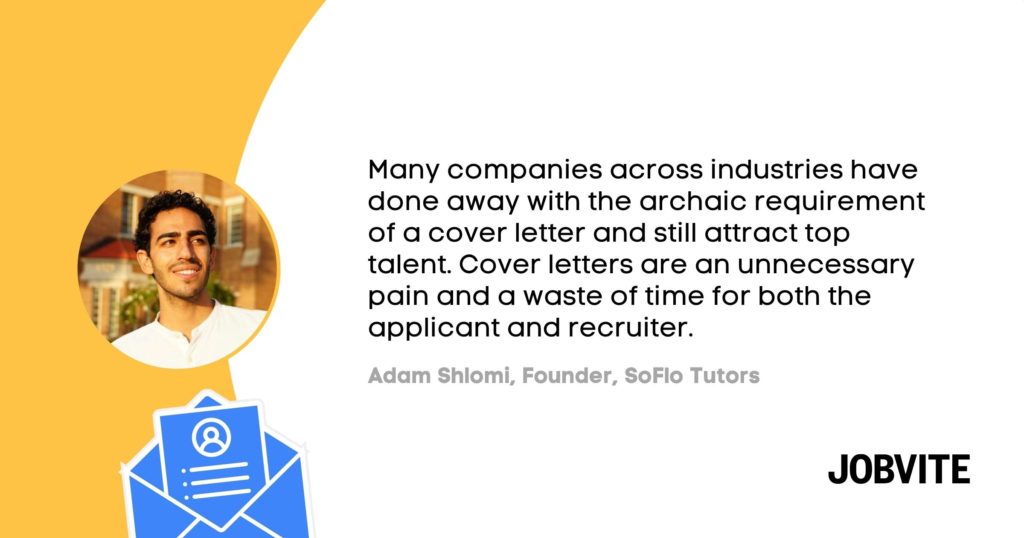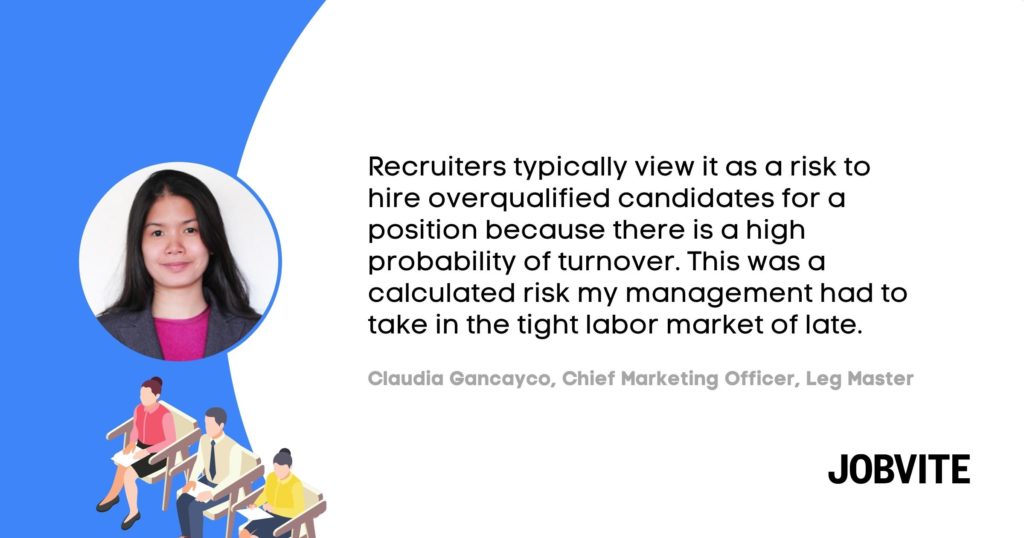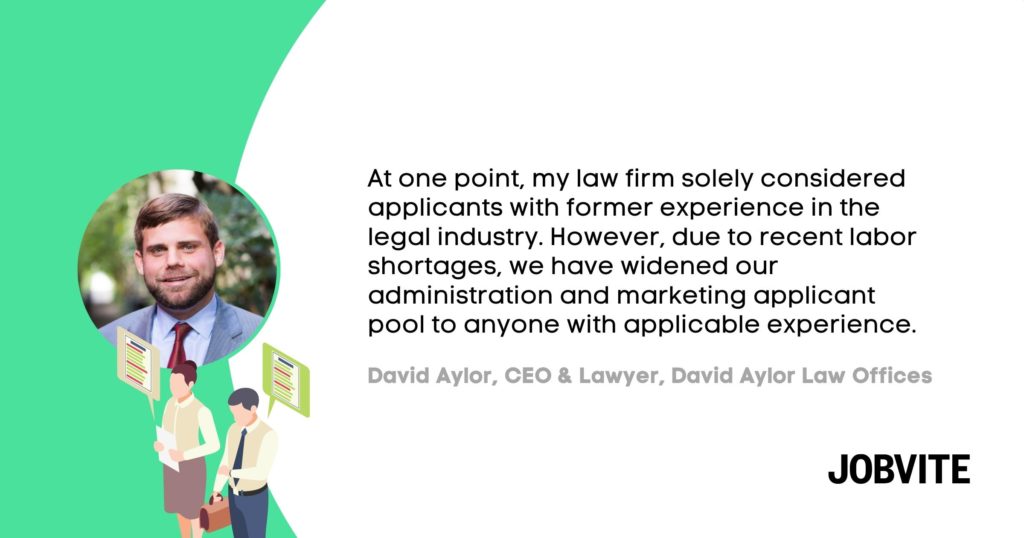
How have you loosened candidate requirements or taken more risks recruiting in a tight labor market?
To help you navigate this challenging hiring environment, we asked CEOs, business leaders, and recruiters what changes they have made to candidate requirements.
From getting rid of cover letters to including candidates willing to relocate, there are multiple strategies that can help you fill vacancies in a tight labor market.
Here are 15 recommendations from business leaders on candidate requirement changes you can make.

1) Getting rid of the cover letter
Many companies across industries have done away with the archaic requirement of a cover letter and still attract top talent. Cover letters are an unnecessary pain and a waste of time for both the applicant and recruiter.
Instead, we focus on initially screening through resumes, then exploring questions of motivation, thought process — things originally described in the cover letter — during interviews.
Adam Shlomi, Founder, SoFlo Tutors
2) Allowing outside-of-industry experience
At one point, my law firm solely considered applicants with former experience in the legal industry. However, due to recent labor shortages, we have widened our administration and marketing applicant pool to anyone with applicable experience.
They don’t need to have experience specifically working for a law firm, though that is preferred, and we are willing to interview candidates who can apply previous professional knowledge to our open roles.
So far, taking this risk has worked to our benefit. Although our new hires may not have former experience in law, they still have the skills needed to excel in their positions. This has opened our candidate pool to include more potential employees with extensive experience and terrific work ethics.
David Aylor, CEO & Lawyer, David Aylor Law Offices
3) Hiring based on referrals and recommendations
One way we’ve not only taken more risks in recruiting but also made the time-to-hire a lot shorter is by hiring based on employee referrals and customer recommendations.
As there is someone to vouch for them in terms of character and work ethics, we believe the rest can come with time and the skills can be easily taught.
Instead of wasting time going through the hiring process, we check referrals and ask why the employee recommends them, and based on their responses, we’re willing to hire new candidates and teach them the skills they need.
4) Focusing on potential for growth
In the current labor market, we have been very focused on identifying potential in new hires. Where a candidate may lack experience, we focus on where they see themselves growing best.
The fact of the matter is that the experienced labor force continues to retire faster than it replenishes. Investing in the future ensures fresh ideas, room to grow, and a strong sense of loyalty from giving them a good place to start.
Kevin Callahan, Co-Founder & CEO, Flatline Van Co.
5) Widening the pool of candidates
No, we have not loosened our candidate requirements. We have, however, become more flexible in our approach to recruiting and hiring. For example, we have increased our use of social media and online job boards to reach a wider pool of potential candidates.
We have also worked with staffing agencies to identify qualified candidates. We have been willing to consider candidates who may not have all the traditional qualifications for a position but who demonstrate the potential to be successful in the role.
As a result of these changes, we have seen an increase in the number of candidates who apply for our openings. In addition to this increased volume, there has also been an increase in quality among candidates, which has helped us deal with the tight labor market.
Shaun Connell, Founder, Writing Tips Institute
6) Entertaining applicants with resume gaps
While it’s risky to hire applicants who have been unemployed for quite some time, our business is open to working with them if they’re the best fit for the job.
In terms of recruiting, resume gaps are not a big deal for us. What we need are people who have the right personality and skills to perform the role they are about to play.
Keep in mind that the past few years have been difficult for many people, especially in looking for a job when most businesses are shutting down.
We don’t know how many talented people out there deserve a chance, so it’s fair to give everyone the opportunity to apply and prove themselves, regardless of their employment history. Only then can we find someone who embodies our company values and has no problem working with us in the long run.
Adam Garcia, CEO & Owner, The Stock Dork

7) Making pledges for accommodation
At the time of the tight labor market, it is quite impossible to find a good employee who can fulfill all the requirements of our company efficiently. At our company, we have to promise different attractive benefits in order to attract candidates.
One of the biggest risks that we have taken was the pledge for accommodation.
We already knew that it will be difficult for us to manage and it will create different problems for us in the future, but we had no other choice and we took this risk to fill the gap of employees in our company.
Joe Troyer, Chief Marketing Officer, ReviewGrower
8) Offering high salaries
One of the biggest risks that we have taken while recruiting in a tight labor market was offering handsome salaries to the candidates so that they would join our company. But, this affected our profit level pathetically because the salaries we offered were totally out of budget.
We didn’t have any way out of the employee shortage, and that was the reason why we took this risk. Our decision was totally in the favor of employees, but it was against our betterment and long-term benefit.
Robert Warner, Head of Marketing, Virtual Valley
9) Prioritizing soft skills
It’s not that we’ve loosened our grip. But, we have started to approach recruiting and candidate requirements differently due to the continually tight labor market.
Instead of looking at the technical skill set we desired, we started looking at the soft skills we valued as a company, which widened our search and strengthened our team.
For example, your search will be pretty long and limited if you are looking for a specific skill set. If you instead look for a candidate with great communication, teamwork, and leadership skills who’s eager to learn and grow with your company, you can invest that time and energy into teaching them.
By searching for candidates with strong soft skills who can learn exactly what the job requires, you are building a company whose team is specifically trained and whose top priority is teamwork.
Susan Shaffer, President, Pneuma Nitric Oxide
10) Changing education requirements
Requiring a degree for a job position significantly slashes the scope of applicants to recruit. Removing this requirement from our job descriptions is one tactic I went for to cope with the tight labor market.
In my niche, I believe that skills and experience are heavier credentials than a diploma. I don’t want to lose potential best employees because they are lacking in technicality.
I started to value self-learners who have amassed a great amount of experience or have grown their portfolio because of their resilience. I don’t want to miss the opportunity of working with some of the industry’s best just for the reason that they’re missing a piece of paper because of its price tag.
This goes without saying that we equally value candidates who worked hard to earn a degree, but it’s more of we don’t discriminate against those who were not able to do so.
Josh Tyler, CEO, Tell Me Best

11) Hiring overqualified candidates
Recruiters typically view it as a risk to hire overqualified candidates for a position because there is a high probability of turnover. This was a calculated risk my management had to take in the tight labor market of late.
To mitigate our risks, we conducted more thorough applicant interviews to give us deeper insights into the reason why an overqualified applicant is applying for a job that is below their level.
Candidates with reasons that make valid and reasonable arguments are often considered.
For example, we are willing to take a risk on accepting an overqualified applicant who is seeking a lower job offer for a reduced workload or those opting to shift career tracks.
Claudia Gancayco, Chief Marketing Officer, Leg Master
12) Focusing on skills more than experience
In today’s job market the ideal candidate is either unwilling to leave their current company or gets counter-offered by another company. This means we’ve had to take more risks and adjust who an ideal candidate is depending on who is available.
For example, instead of hiring people based on overall experience, I’ve been focusing more on their skill set in the most important functions in a role, not how long they’ve had that experience, but more on their knowledge, their ambition or passion about that skill, and improving on those skills and others they don’t have that much experience in.
I’ve also seen many candidates moving industries, which we saw less of in the past, and the key to a successful transition is focusing on their transferable skills from their old industry to the new one.
Heather Scott, Recruiter, Sojourn Solutions
13) Expanding the search area
Previously, some clients who had an office in Ukraine were ready to consider candidates only in certain locations, for example, only Kyiv, Lviv or another city of Ukraine where an office was located.
The work schedule included some days of work from the office and the rest could be done remotely. After the start of the full-scale invasion of Russia into Ukraine, many engineers went abroad or changed their location within Ukraine.
Therefore, clients are ready to work with IT specialists remotely from different locations, regardless of where the IT specialist is currently located.
If a company has built a workplace where employees can work remotely, it doesn’t really matter where the person is. Some clients have switched to the format of international teams, where specialists from different countries and different nationalities work. In this case, we search all over the world.
This helps to quickly close important vacancies with good candidates.
Vadim Lobarev, CEO, MindHunt
14) Considering junior candidates
Consider juniors as investments. With the unemployment rate we are facing, we have to seek different ways to work with candidates. We can’t wait for 100% fit candidates. They might never appear.
The trend that I see and support is an investment into junior candidates’ potential and internal training & development programs. It’s risky, and it takes time and money, but if you do it well, they return it to you. In a business case where this model is NO GO, we try to revise requirements in comparison with real use in daily operations.
Most of the time, we find English as a mandatory criterion, but, in reality, employees never use it.
Barbora Školaudy, Head of Recruitment, Talent’em
15) Including candidates willing to relocate
Most of our clients are looking for candidates already living in the area of their workplace, and of course, people who already have an in-force work permit.
Due to the lack of candidates fulfilling all their requirements lately, we are widening our pool, including people who are willing to relocate to the area considered.
We focus mostly on EU citizens, though, since that makes the paperwork much easier.
Javier de la Morena, Co-Founder, NBS IT Recruitment Consultants, S.L.
Discover how you can better evaluate job candidates for open roles at your enterprise with evolve, our advanced Talent Acquisition Suite. Schedule a one-on-one demo today.

